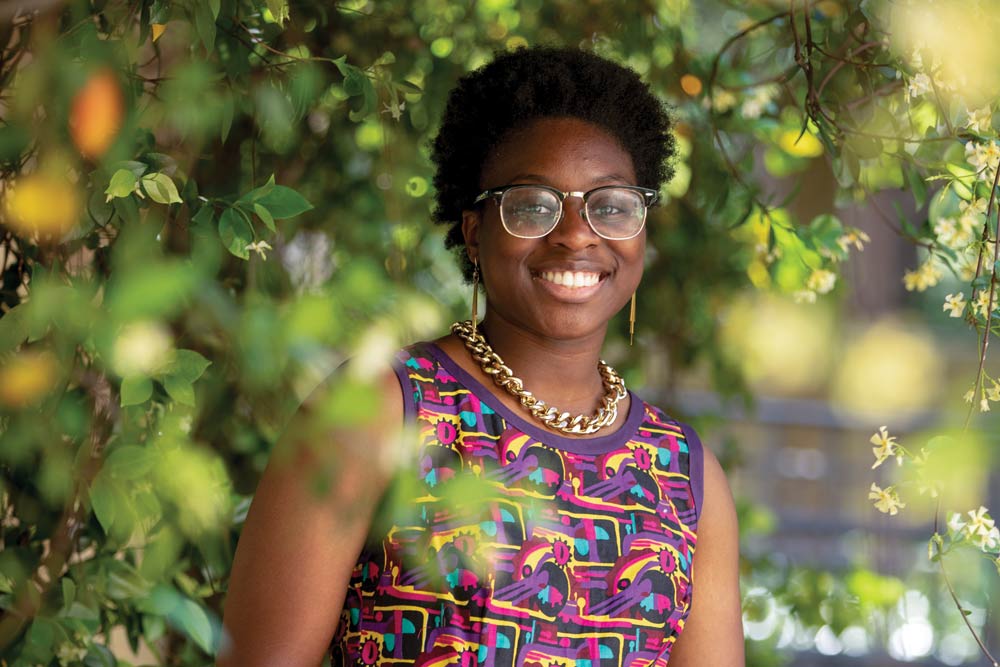
In spring 2018, College of Education student Vida Nwadiei joined three undergraduates from other colleges on campus to compete in the inaugural university-wide program, the President’s Award for Global Learning. Now in its second year, the program promotes international research, social impact, and entrepreneurship in seven regions throughout the world.
Colorism is a form of prejudice that says a person with a slimmer nose, bigger eyes, straighter hair, and lighter skin has more value. People around the world believe that these qualities make people more desirable, successful, and intelligent.
Colorism creates a social hierarchy within homogenous communities of color that says the more European a person looks, the more acceptable they are to their community. These values are often internalized.
In South Korea one in three women between the ages of 19 and 29 undergoes double-eyelid surgery, rhinoplasty (nose job), or jaw reconstruction surgery. African American women in the U.S. straighten their hair. Africans, Asians, and Latin Americans take skin-lightening pills or use skin-bleaching creams on themselves and their children to lighten their skin.
In August 2016, Ghana placed a ban on skin-bleaching products containing a harmful substance called hydroquinone. Despite the ban, the multibillion-dollar industry of skin-bleaching products still dominates the West African cosmetics market. This creates a world of mixed messages for women. In Ghana, colorism is often most pronounced among professional and preprofessional women.
Nwadiei and her teammates Timia Bethea, Rebecca Chen, and Christina Cho competed to be one of seven teams selected to conduct region-focused research that would have a lasting impact on its citizens. Their proposal: explore the influences of colorism in Ghana through the lenses of media and businesses, identity and self-worth, the cyclical nature of skin bleaching in families, and social mobility.
A pre-physical therapy senior majoring in exercise science, Nwadiei and her team were selected from a field of 28 and received a $25,000 grant to implement their two-year, self-proposed project in Africa: The Color Complex.
Nwadiei’s team has worked throughout the process with three faculty members that they selected to serve as subject matter experts: Kevin Cokley, Oscar and Anne Mauzy Regents Professor for Educational Research and Development in the College of Education; John Doggett, senior lecturer in the McCombs School of Business; and Minette Drumwright, associate professor in the Moody College of Communication.
We want to take this from a summer project, to a movement, to something that can be institutionalized. This is a global issue that we want to begin to tackle here at The University of Texas.
Vida Nwadiei
Nwadiei, Bethea, Chen, and Cho spent the summer of 2019 in Accra interviewing Ghanaian women about their experiences with personal care products and their attitudes toward beauty practices. “Our time in Accra was part of our plan to create separate and specialized social media campaigns that will run at UT Austin and the University of Ghana to mitigate the negative effects of this serious mental health concern,” Nwadiei says.
When the team came back for the fall semester, they started working with two advertising classes, both led by Galit Marmor-Lavie, lecturer in the Moody College of Communication. “We want students to be able to talk about their own experiences, understand each other’s experiences, and begin a process of healing. We want to take this from a summer project, to a movement, to something that can be institutionalized. This is a global issue that we want to begin to tackle here at The University of Texas,” Nwadiei says.

